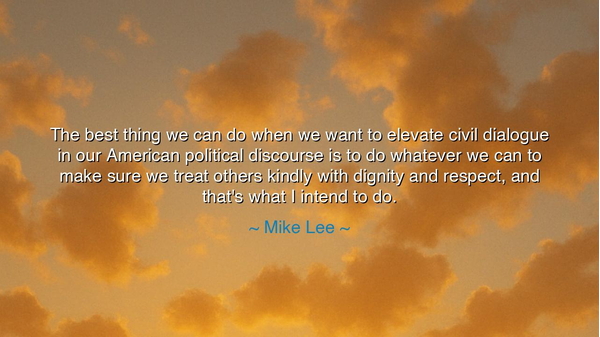
The best thing we can do when we want to elevate civil dialogue
The best thing we can do when we want to elevate civil dialogue in our American political discourse is to do whatever we can to make sure we treat others kindly with dignity and respect, and that's what I intend to do.






Mike Lee, a voice from within the chambers of American governance, declared: “The best thing we can do when we want to elevate civil dialogue in our American political discourse is to do whatever we can to make sure we treat others kindly with dignity and respect, and that's what I intend to do.” Though born from the fires of modern politics, these words carry the tone of ancient wisdom. For what is society, if not built upon dialogue? And what is dialogue, if not destroyed when kindness and respect are abandoned? In every age, civilization has endured not merely through laws and armies, but through the ability of its people to speak to one another as human beings first, and opponents second.
The origin of this thought arises from the growing bitterness of political life. Lee, seeing the divisions and harshness of debate, pointed back to the timeless virtues of kindness, dignity, and respect. These are not soft words, nor weak, but the very pillars of peace. For the tongue, though small, can destroy kingdoms if left unchecked. And in the republic of America, where words shape laws and laws shape lives, dialogue without respect is poison to the nation itself.
The ancients knew this truth. In Athens, the birthplace of democracy, great debates thundered through the assembly. Men disagreed fiercely, but the principle of isonomia—equal respect before the law—kept discourse alive. When Rome abandoned respect, when senators turned to insults and daggers, the republic fell into tyranny. Thus history itself proclaims: the fate of nations is tied not only to the strength of their armies, but to the civility of their discourse.
Consider the story of Abraham Lincoln, who in the darkest days of America’s Civil War sought not only to defeat his enemies but to heal them. In his second inaugural address, he spoke “with malice toward none, with charity for all.” These words did not erase the war, but they set the tone for reconciliation. Lincoln showed that treating others with dignity and respect—even in conflict—is the seed from which lasting peace can grow. His example stands as a living testament to Lee’s words, echoing across centuries.
The lesson is clear: if we wish to preserve dialogue, we must first preserve respect. Harshness may win an argument, but it will never win the soul of a people. Mockery may silence an opponent, but it cannot build trust. Only kindness has the power to elevate debate from shouting to reasoning, from division to understanding. When dignity is preserved, truth can be sought. When respect is present, even disagreement becomes fruitful.
Practical actions follow. In your conversations, whether in politics, in work, or in family, guard your tongue. Speak as though the other is your equal, no matter how opposed. Listen before you answer, for respect begins with hearing. Refuse the temptation of cruelty, for every insult weakens the bond of community. Instead, choose words that build, that clarify, that preserve the dignity of those who hear them. This is not weakness; it is the discipline of true strength.
Thus, O listeners, let Lee’s words be remembered: to elevate civil dialogue is to anchor it in kindness, dignity, and respect. This is the path not only for politicians, but for all who live together in community. Nations are not destroyed first by swords, but by the crumbling of trust and dialogue among their people. If we guard our words, we guard our future.
And remember this eternal truth: to treat others with dignity is not simply a courtesy—it is the foundation of peace, the breath of justice, and the shield of freedom. Without it, dialogue collapses into chaos. With it, even the fiercest debates can lead to wisdom. Choose respect, and you will help preserve the harmony upon which all societies stand.






AAdministratorAdministrator
Welcome, honored guests. Please leave a comment, we will respond soon